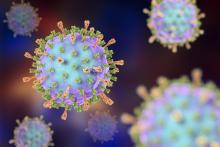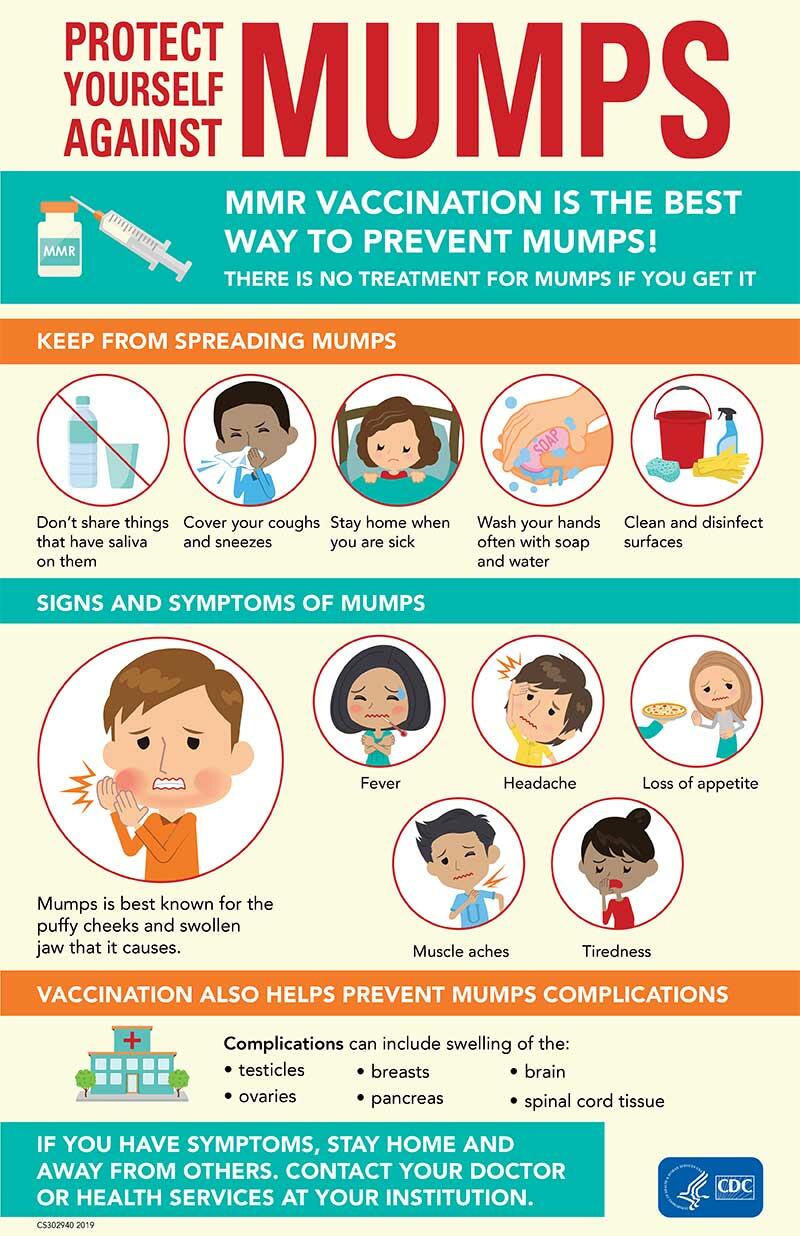Immunizations: Mumps
Mumps is a disease caused by the mumps virus. It is contagious and spreads from person to person.
Mumps is an acute disease. That means it usually makes you sick for a short time.
A vaccine can prevent mumps
The best way to prevent mumps is to get the vaccine.
Learn more about the vaccine for mumps
About mumps
Mumps is a contagious disease that easily spreads from person to person. It can spread through direct contact or droplets in the air.
An infected person can spread droplets when they talk, cough, sneeze, or share cups or dishes with other people.
Protect yourself against mumps
MMR Vaccination is the best way to prevent mumps!
There is no treatment for mumps if you get it.
Mumps disease can lead to:
- Deafness.
- Infection of the brain and spinal cord (meningitis).
- Painful swelling of the breasts and testicles or ovaries.
- Inability to have children (in rare cases).
Keep from spreading mumps
- Don't share things that have saliva on them
- Cover your coughs and sneezes
- Stay home when you are sick
- Wash your hands often with soap and water
- Clean and disinfect surfaces
Signs and symptoms of mumps
Mumps is best known for the puffy cheeks and swollen jaw that it causes
- Fever
- Headache
- Loss of appetite
- Muscle aches
- Tiredness
After a few days, the glands in and around your mouth may swell. This swelling can lead to painful, puffy cheeks and neck. Some patients have trouble swallowing.
You can spread the disease up to five days after symptoms start.
Vaccination also helps prevent mumps complications
Complications can include swelling of the:
- Testicles
- Breasts
- Brain
- Ovaries
- Pancreas
- Spinal cord tissue
If you have symptoms, stay home and away from others. Contact your doctor or health services at your institution.
The best way to avoid getting sick from mumps is to get the vaccine. The vaccine has greatly reduced mumps cases in the United States. Outbreaks still occur in close-knit communities, including colleges.
The MMR vaccine protects against three diseases: mumps, measles, and rubella. The CDC (Centers for Disease Control and Prevention) recommends all children get two doses of the MMR vaccine:
- First dose at 12–15 months of age.
- Second dose at 4–6 years of age.
Teens and adults also should be up to date on their mumps vaccination. People planning to be somewhere where measles or mumps spread more easily should make sure they’re vaccinated. The vaccine is important for people who:
- Live or study at a college, university or other location for higher education.
- Work in health care.
- Plan to travel to another country.
Find out if you and your children got the vaccine to protect against mumps. Check our Department of Health Services (DHS) Wisconsin Immunization Registry.
If you’re worried about cost, your family may be eligible for free vaccines. Read about our Vaccines For Children and Vaccines For Adults programs.
- DHS fact sheet—Mumps, P-42110
- CDC disease overview—Mumps
- CDC vaccine information statement—Measles, Mumps, Rubella
- CDC fact sheet for parents—Mumps Vaccination
- CDC infographic for college students—Don’t Let Mumps Spoil Your Fun
- CDC infographic for college students—Mumps Can Really Ruin a Selfie
- Medscape—CDC Expert Commentary
- National Institute of Health journal articles—Mumps
- CDC—Vaccine safety
Data and statistics
Just for health care providers
Mumps is a communicable disease. Health care providers must report cases of mumps.
Mumps is a Wisconsin Disease Surveillance Category II disease.
Report a recognized case to the patient’s local public health department. Within 72 hours, submit a case report through one of the following:
- Wisconsin Electronic Disease Surveillance System (WEDSS)
- Mail or fax—Acute and Communicable Disease Case Report, F44151 (Word)
Read more about required disease reporting in Wisconsin.
Case reporting and public health guidelines
- Mumps, Communicable Disease Case Reporting and Investigation Protocol EpiNet, P-01969 (PDF): mumps infection case reporting and investigation protocol for health professionals
- DHS surveillance and control guidelines—(in revision)
- DHS Division of Public Health Surveillance and Control Guidelines are currently in revision as of June 25,2024.
- In the meantime, refer to CDC’s guidance on mumps.
- For questions contact Stacey Moyer at Stacey.Moyer@dhs.wisconsin.gov or Sarah Born at Sarah.Born2@dhs.wisconsin.gov
- CDC—Instructions for Completing the Mumps Surveillance Worksheet (PDF)
- CDC—Mumps Surveillance Worksheet (PDF)
- CDC recommendation from the Advisory Committee on Immunization Practices: Measles, Mumps, and Rubella
- Wisconsin State Library of Hygiene—Mumps Testing Guidance


